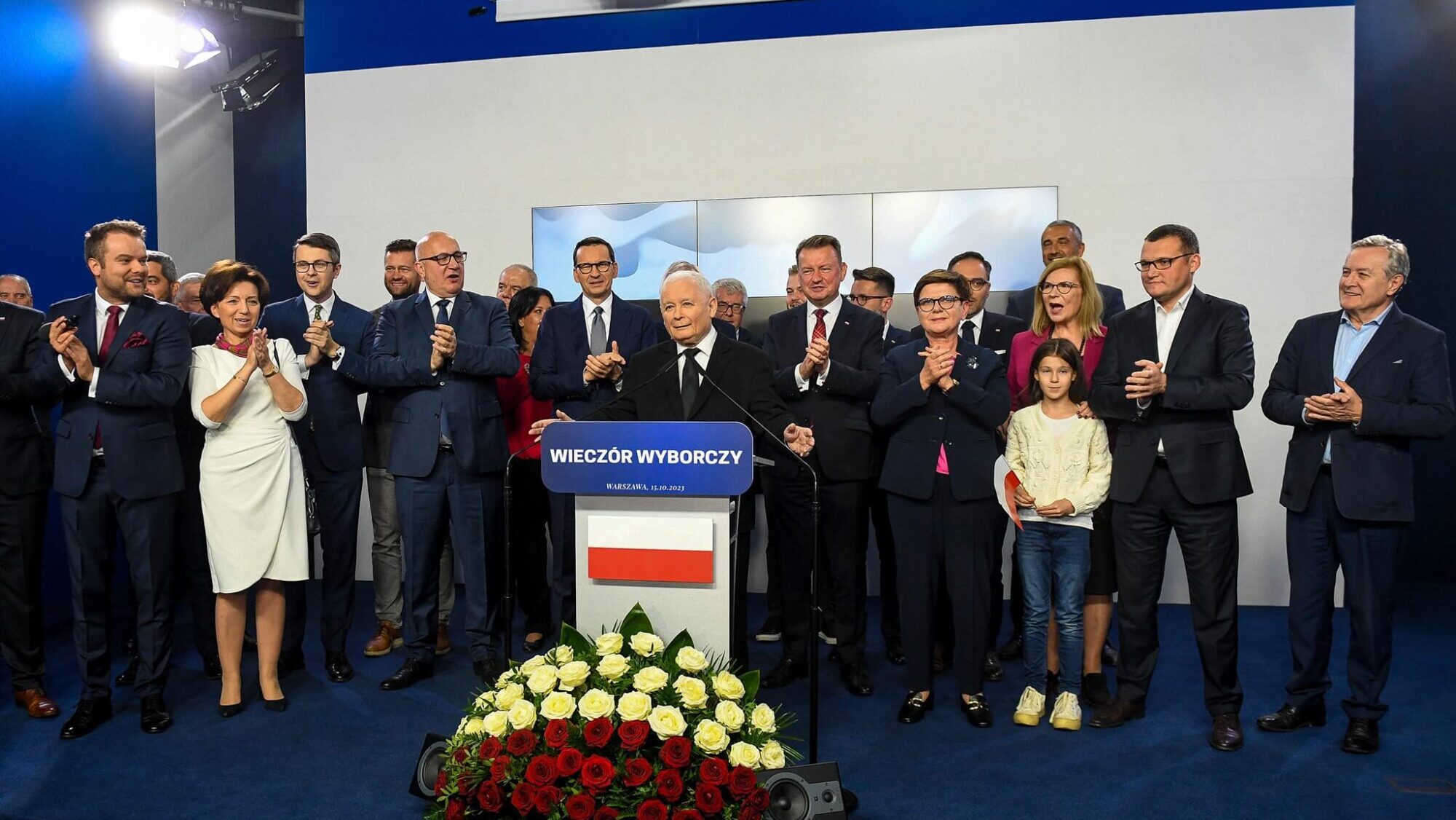
PiS vows to hold on to form a coalition government with agrarians while progressives already claim victory.
Photo: PiS / Facebook
Early indicators from Sunday’s Polish election point to the formation of a rainbow coalition of progressive parties, but conservative Law and Justice (PiS) leader Jarosław Kaczyński insisted that “it is not over yet” as he expressed his wish to still form a majority government.
While the official vote count is still going on, exit polls released Sunday night indicate a better-than-expected showing for Poland’s liberal opposition, despite Donald Tusk’s Civil Coalition Party only performing roughly as well as in the last election. The ruling PiS party remained the largest party in terms of both parliamentary representation and popular support—a result that, if it holds, could herald many weeks of uncertainty for the Eastern European nation if true.
Poland, Ipsos late poll:
— Europe Elects (@EuropeElects) October 16, 2023
Seat projection
PiS-ECR: 198 (-2)
KO-EPP|RE|G/EFA: 161 (-2)
TD PL2050/PSL-RE|EPP: 57 (+2)
NL-S&D: 30
Kon~NI: 14 (+2)
Majority: 231
+/- vs. exit poll
Fieldwork: 15 October 2023
➤ https://t.co/TMumh6CCxH#Polska #Wybory2023 pic.twitter.com/aoTAu7x4xl
With just over a quarter of the vote counted, PiS appears to have dropped 3%, which would be enough to lose their majority within the Polish Parliament (Sejm). The result may look worse for PiS as more urban areas are counted.
While it will likely take until Tuesday for results to be properly tallied, if exit polls are vindicated, a strong performance for the opposition among young, middle-class, and western voters could potentially end eight years of conservative PiS rule in Poland; a result that could radically upset Europe’s political balance of power.
The atmosphere at PiS campaign headquarters was subdued but not defeated. Most insiders believe that the party has a near-impossible path to maintain power but still performed well enough to prevent internal disunity after two terms in power.
A three-way coalition led by former European Council President Donald Tusk and his Civic Coalition (KO) party along with the leftist Lewica and centrist Third Way parties have a majority of twenty seats in the Sejm, should exit polls be believed.
The pressure has been on PiS for months, emanating from a Brussels-led campaign against the party’s governance on “rule of law” claims as well as recent media takeovers favouring the opposition.
PiS was caught off-balance by a dispute with senior generals over the politicisation of the army in the final week of campaigning as it made migration, pension reforms, and alleged German interference in Polish politics their primary issues during the race.
While the Polish media have been quick to call a victory for the opposition, PiS has shown no sign of throwing in the towel, already attempting talks with the agrarian party PSL to form a working majority, so far, to no avail.
“We will not allow Poland to lose what is most valuable in the history of our nation, the most valuable because of its experience, that is, independence, the right to decide about its own fate,” said PiS leader Jarosław Kaczyński Sunday, fueling expectations that the conservatives fully expect to hold onto power by any means necessary through coalition formation.
Simultaneous referenda, including one on migration, could also be in doubt due to poor voter turnout. This, despite the referendum easily attaining a majority with over 98% of Poles who voted objecting to “the admission of thousands of illegal immigrants from the Middle East and Africa, in accordance with the forced relocation mechanism imposed by the European bureaucracy.”
Donald Tusk will now have approximately three months to negotiate the terms of a coalition deal with smaller parties as the Polish parliament is scheduled to reassemble on November 14th. Despite losing their majority, PiS retains control of the constitutionally important office of the presidency not up for re-election until 2025. The expectation is now that the conservatives will frustrate any liberal agenda.
PiS MEP Ryszard Czarnecki has blamed a decline in support for PiS on overly generous support for Ukraine during the ongoing grain crisis and said that the Polish government’s criticism of the war came too late to avert the loss.
Sunday was also bad news for the identitarian Konfederacja party which heavily underperformed, despite being more popular than PiS among youth voters in what is seen as a substantial setback for the party.
Europhiles both in Poland and abroad have been jubilant at the news, seeing a potential now for the European Commission to unfreeze billions worth of funding tied up in a long-running dispute with the PiS government over the appointment of the Polish judiciary.
